Book Seven: The Final Meltdown
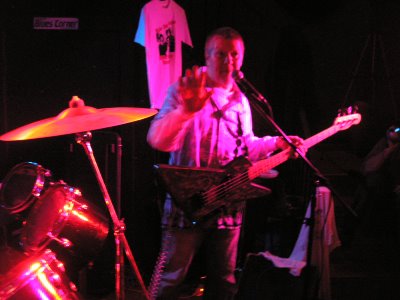

















Thanks to all who made the reunion gig such a blowing success! A complete update--photos and all--will follow shortly. In the meantime, there are a few T-shirts left in adult sizes S, M, L, and XL in the designs shown. The going price is $10 and can be bought at T. Shepard's Discount Music in Huntsville, Alabama or ordered directly from me, plus s&h. Email me for details.



Here are some declassified photos from the Whales archives. All available pertinent info will be included. Please email any photos you'd like to share with and/or donate to the archives. Enjoy.


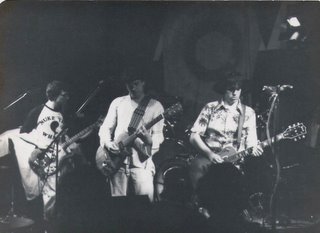
 Kaffeeklatsch, summer, 1981. Phil and John hard at work. Keyboardist John Steinberg is just out of sight to the left. Trophy is for dance contest winners/losers.
Kaffeeklatsch, summer, 1981. Phil and John hard at work. Keyboardist John Steinberg is just out of sight to the left. Trophy is for dance contest winners/losers. Very early gig with bassist Tommy Shepard. Tony Mason's place, October, 1981. Camelot Music employees seated down front. Note Walter's guitar a la Woody Guthrie. Sort of.
Very early gig with bassist Tommy Shepard. Tony Mason's place, October, 1981. Camelot Music employees seated down front. Note Walter's guitar a la Woody Guthrie. Sort of.

 Halloween at UAH, 1982 or '83. Tommy, Walter, John, Phil. Walter had started the evening in drag, performing "Sweet Transvestite." All good things must come to an end.
Halloween at UAH, 1982 or '83. Tommy, Walter, John, Phil. Walter had started the evening in drag, performing "Sweet Transvestite." All good things must come to an end.
And now, the REST of the story. There were other Whales.
 joined the Whales at the ripe old age of seventeen. It was refreshing to hear someone sing Alice Cooper's "Eighteen" from the other side of the fence. Ant could play his booty off, and play it off he did. Still smoking with his band Toy Shop (www.toy-shop.us). Check them out when you get a chance. Sharpe was in the Whales from 1983 to 1984. His musical abilities, added to those of bassist Crouch, gave the band a new vitality and helped forge a much more "real" rock & roll band sound. Ant recently celebrated his 75th birthday (still the youngest Whale), and he still plays and sings like he did way back during the Great Depression, when he performed at the White House for FDR. Unreal.
joined the Whales at the ripe old age of seventeen. It was refreshing to hear someone sing Alice Cooper's "Eighteen" from the other side of the fence. Ant could play his booty off, and play it off he did. Still smoking with his band Toy Shop (www.toy-shop.us). Check them out when you get a chance. Sharpe was in the Whales from 1983 to 1984. His musical abilities, added to those of bassist Crouch, gave the band a new vitality and helped forge a much more "real" rock & roll band sound. Ant recently celebrated his 75th birthday (still the youngest Whale), and he still plays and sings like he did way back during the Great Depression, when he performed at the White House for FDR. Unreal. The year was 1983, or something like it. Out of the South came a howling wind, fierce enough to shatter the Spruce Goose. And they called it Opie. Sometimes known by his stage name, Mike Williamsom, Opie blew into town about the same time SRV hit the scene, and they both left their mark. Opie could play like nobody's business, and it was. He burned 'em down with an intensity that was hard to find in the Valley at that time. He filled in for the ailing Walter Berry at a gig or two, and went along for moral support at many more. Opie then found himself in The Loons with closet-rocker and Jewel Shop owner David Weinstein. Now THAT was a LOUD band. He later fronted The Pontiacs and set a new standard for blues-based rock guitar in the Tennessee Valley. After that came the self-deprecating Hugh Mungus Trio. Like so many lucky souls, he found a good woman, settled down, and put that rock & roll foolishness behind him. Oh, the humanity. Say it ain't so, Op, say it ain't so.
The year was 1983, or something like it. Out of the South came a howling wind, fierce enough to shatter the Spruce Goose. And they called it Opie. Sometimes known by his stage name, Mike Williamsom, Opie blew into town about the same time SRV hit the scene, and they both left their mark. Opie could play like nobody's business, and it was. He burned 'em down with an intensity that was hard to find in the Valley at that time. He filled in for the ailing Walter Berry at a gig or two, and went along for moral support at many more. Opie then found himself in The Loons with closet-rocker and Jewel Shop owner David Weinstein. Now THAT was a LOUD band. He later fronted The Pontiacs and set a new standard for blues-based rock guitar in the Tennessee Valley. After that came the self-deprecating Hugh Mungus Trio. Like so many lucky souls, he found a good woman, settled down, and put that rock & roll foolishness behind him. Oh, the humanity. Say it ain't so, Op, say it ain't so.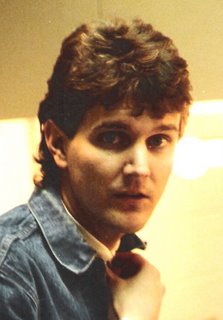 Filling Waddy's shoes is not an easy task. How is it done? Ask Keating Johns who stepped into the spotlight as a one-time Whale when he booked a gig for a band he didn't have (or the band fell apart after the gig was booked, or something). Keating called Proctor in the summer of 1984 (?) and offered him a gig at Birmingham Southern. His plan was to book the Whales, with Berry, and add himself on guitar and vocals. Good plan. Walter showed, played a set, and split, leaving the gig to the Whales with Keating as frontman. That association led to Johns calling Proctor the following year to fill in for his current lead guitarist on a club date in Tuscaloosa. The combination worked and with old friend Bart Mastin in on drums, the Power Mowers were off and running. But not for long. The name of the band was immediately changed to Instant Karma, a band that at various times included Johns, Proctor, Mastin, Greg Mullins, Ken Adams, and Greg Staggs. This band lasted from 1985 to 1988, making a name for itself throughout the Deep South. Let's see, 1985 plus 25 equals 2010...
Filling Waddy's shoes is not an easy task. How is it done? Ask Keating Johns who stepped into the spotlight as a one-time Whale when he booked a gig for a band he didn't have (or the band fell apart after the gig was booked, or something). Keating called Proctor in the summer of 1984 (?) and offered him a gig at Birmingham Southern. His plan was to book the Whales, with Berry, and add himself on guitar and vocals. Good plan. Walter showed, played a set, and split, leaving the gig to the Whales with Keating as frontman. That association led to Johns calling Proctor the following year to fill in for his current lead guitarist on a club date in Tuscaloosa. The combination worked and with old friend Bart Mastin in on drums, the Power Mowers were off and running. But not for long. The name of the band was immediately changed to Instant Karma, a band that at various times included Johns, Proctor, Mastin, Greg Mullins, Ken Adams, and Greg Staggs. This band lasted from 1985 to 1988, making a name for itself throughout the Deep South. Let's see, 1985 plus 25 equals 2010...
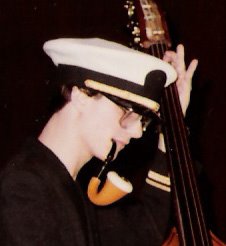 Bassists come and bassists go, and sometimes peter out, you know. But we'll be friends through thick or thin...Well, the original Whales bassist, by whose standard all others have been judged, was Philip Franklin. Nicknamed "Funky" for various reasons, Philip's first rock & roll band Zebedee, was formed in 1975. The lineup included fellow future Nuker Phil Proctor on guitar and future Whiz Kid Alan Jenkins on drums. That three-piece added a fourth member, Ed Miller, played a few YMCA dances, and then found itself without a bassist. Funky Philip had left the fold for more fertile musical territory with Robert Adamek and Thor. Well, jump ahead a few years and you have Philip and Phil rejoined in NTW, and the old magic was back (someone roll down the windows, please). Philip helped define the sound of the band with his bass as well as his voice. He catterwalled songs like "She's So Cold," "Surfin' USA," and the classic "Boogie 'Til You Puke." Philip also loaned the Whales his bitingly dry sense of humor, making those early road trips more fun than a vacation with Granny and the young 'uns.
Bassists come and bassists go, and sometimes peter out, you know. But we'll be friends through thick or thin...Well, the original Whales bassist, by whose standard all others have been judged, was Philip Franklin. Nicknamed "Funky" for various reasons, Philip's first rock & roll band Zebedee, was formed in 1975. The lineup included fellow future Nuker Phil Proctor on guitar and future Whiz Kid Alan Jenkins on drums. That three-piece added a fourth member, Ed Miller, played a few YMCA dances, and then found itself without a bassist. Funky Philip had left the fold for more fertile musical territory with Robert Adamek and Thor. Well, jump ahead a few years and you have Philip and Phil rejoined in NTW, and the old magic was back (someone roll down the windows, please). Philip helped define the sound of the band with his bass as well as his voice. He catterwalled songs like "She's So Cold," "Surfin' USA," and the classic "Boogie 'Til You Puke." Philip also loaned the Whales his bitingly dry sense of humor, making those early road trips more fun than a vacation with Granny and the young 'uns.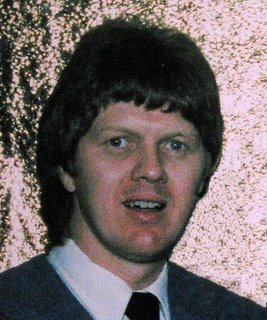 owner and impresario Tommy "T" Shepard. Tommy was already a legend in the halls of his alma mater, Lee High School, where he once cleared the entire science wing with a refrigerator box full of crickets and six bags of Purina hog starter. T stepped in where Philip left off, wiped his feet, and got on with the business of legend-making. He quickly found his niche in this band of musical misfits, and was soon perched atop his seven-foot bass rig, jumping to and fro with the energy of a man twice his age. There was no stopping this man-devil-rocker. Just ask the attendants at the Tennessee Welcome Center on I-24 outside of Nickajack, or the little Whalettes in Mountain Brook, or even the exotic dancers at the McCaully Lake party. Those were the days, my friend. We thought they'd never end...
owner and impresario Tommy "T" Shepard. Tommy was already a legend in the halls of his alma mater, Lee High School, where he once cleared the entire science wing with a refrigerator box full of crickets and six bags of Purina hog starter. T stepped in where Philip left off, wiped his feet, and got on with the business of legend-making. He quickly found his niche in this band of musical misfits, and was soon perched atop his seven-foot bass rig, jumping to and fro with the energy of a man twice his age. There was no stopping this man-devil-rocker. Just ask the attendants at the Tennessee Welcome Center on I-24 outside of Nickajack, or the little Whalettes in Mountain Brook, or even the exotic dancers at the McCaully Lake party. Those were the days, my friend. We thought they'd never end...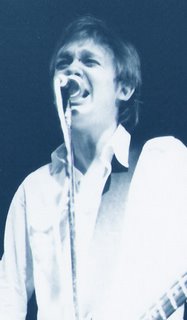 bassist with the Whales. Kenny had spent time in several successful area bands, some fronted by the venerable Butch Menefee. In the early eighties he, along with Mike Eden, put together a bona fide punk band named Youth In Asia. They were one of the few serious punk bands in the Rocket City--definitely the best. After that folded Kenny took up with the Whales, bringing his incredible vocals along, free of charge. The band seemed reinvigorated. Kenny added an air of seriousness that helped push the band in a different direction--less slapstick, more music. Seventeen-year-old Antony Sharpe was added on guitar--a smoking talent even at that young age--and then Walter moved to Birmingham, the gigs thinned out, and chaos reigned. Walter put together his own "scab" Whales including Tommy Shepard--this time on guitar--Chris Stephens on bass, and a few others who slip the mind of this blogger. A few more personnel changes may have taken place before the final Whale gig at a private party in Mooresville, Alabama in 1985. That is the history, in a nutshell, of Huntsville's GREATEST ROCK & ROLL BAND EVER.
bassist with the Whales. Kenny had spent time in several successful area bands, some fronted by the venerable Butch Menefee. In the early eighties he, along with Mike Eden, put together a bona fide punk band named Youth In Asia. They were one of the few serious punk bands in the Rocket City--definitely the best. After that folded Kenny took up with the Whales, bringing his incredible vocals along, free of charge. The band seemed reinvigorated. Kenny added an air of seriousness that helped push the band in a different direction--less slapstick, more music. Seventeen-year-old Antony Sharpe was added on guitar--a smoking talent even at that young age--and then Walter moved to Birmingham, the gigs thinned out, and chaos reigned. Walter put together his own "scab" Whales including Tommy Shepard--this time on guitar--Chris Stephens on bass, and a few others who slip the mind of this blogger. A few more personnel changes may have taken place before the final Whale gig at a private party in Mooresville, Alabama in 1985. That is the history, in a nutshell, of Huntsville's GREATEST ROCK & ROLL BAND EVER. After that first fateful demonstration of power and might, the Whales began a march through the South unequaled even by Sherman's legion of demons in blue. Packing a zealous thirst for converts into each one-night stand, the band forged a reputation as solid as sand. After the Klatsch came Geno's Off the Square, the UAH Student Union Building, and the University of the South. Parties, church picnics, work-release programs--no one was safe. Geno's proved to be the band's home for the next couple years. But just who was this band of atonal apples? Let me introduce you to the fellows:
 Stroking his favorite guitars, his beloved Whales axes with names like Butchie Bob and Hazel, Berry intoned the intamacies of rock balladry like no one had since Harry McClintock back in the 1920s. When Casey Jones opened up the whistle on his 0-8-0, he was only a pale precursor to Waddy's mighty Blues Harps and Marine Bands. Trumpets of the gods. His prowess off the stage is also well-documented, but those court records are currently inaccessible.
Stroking his favorite guitars, his beloved Whales axes with names like Butchie Bob and Hazel, Berry intoned the intamacies of rock balladry like no one had since Harry McClintock back in the 1920s. When Casey Jones opened up the whistle on his 0-8-0, he was only a pale precursor to Waddy's mighty Blues Harps and Marine Bands. Trumpets of the gods. His prowess off the stage is also well-documented, but those court records are currently inaccessible.
 Phil Proctor was barely out of diapers when he first laid eyes on his future wife, a Kent Les Paul copy sold by Sears for the princely sum of $89.99 plus tax. Chosen for its superior playability and light weight, Proctor's musical concubine was always by his side until one dreadful night at the Lake Guntersville State Park Lodge. Opie Williamson recalls that the guitar looked like it had been hastily converted to playing slide with but one drop to the stage. A broken neck was diagnosed by doctor Tommy Shepard. So quoth the Kent "nevermore." Phil, better known as "The Doctor," believed in three basic principles of stage theatrics: 1) rock like it's your last show, 2) bring as much junk to the stage as possible, and 3) never, never stop the show to tune. These principles have haunted the aging asthmatic like a hellhound looking for his master's leg. Now, with his eyes dimmed, hair thin and gray, and having the lungs of a man twice his age, Proctor has once more decided to don a guitar, a pair of pajamas, and a smile (and possibly a dry Depends), in an effort to raise the musical bar one last time. May God have mercy on his friends.
Phil Proctor was barely out of diapers when he first laid eyes on his future wife, a Kent Les Paul copy sold by Sears for the princely sum of $89.99 plus tax. Chosen for its superior playability and light weight, Proctor's musical concubine was always by his side until one dreadful night at the Lake Guntersville State Park Lodge. Opie Williamson recalls that the guitar looked like it had been hastily converted to playing slide with but one drop to the stage. A broken neck was diagnosed by doctor Tommy Shepard. So quoth the Kent "nevermore." Phil, better known as "The Doctor," believed in three basic principles of stage theatrics: 1) rock like it's your last show, 2) bring as much junk to the stage as possible, and 3) never, never stop the show to tune. These principles have haunted the aging asthmatic like a hellhound looking for his master's leg. Now, with his eyes dimmed, hair thin and gray, and having the lungs of a man twice his age, Proctor has once more decided to don a guitar, a pair of pajamas, and a smile (and possibly a dry Depends), in an effort to raise the musical bar one last time. May God have mercy on his friends.
Riding a drum kit like a hopped-up Chevy Malibu, John Harris thundered into the band at its inception. Having played in bluegrass bands (A bluegrass drummer? Apparently so.) with John Starling and Claire Lynch, Harris threw himself headlong into the glamorous world of rock & roll. John 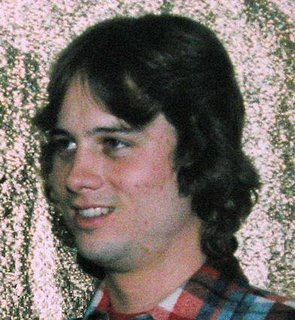 was there from the beginning to the end. He was the Whales' percussive alpha and omega. If there was any rhythm in the band, John had it. He also had a van. And a portable refrigerator full of inspiration. The Whales had many inspirational trips in John's van. There were innumerable treks to Sewanee, Tennessee, past Whale Rock, careening into the parking lot at Shenanigan's for supper and more inspiration, on past that funny zebra painting on someone's front porch, bypassing the Rebel's Rest and on to the Phi house for the evening's business. Those were the days, my friend. And John was there. John's incessant foot on the pedal (drums, van, bikes) made the band move. That right foot of his earned him the nickname "Thumper." O'l Thumper, he used to beat a path down to wherever the action was that night, and take the place down. Legions of stories follow him around. Ask Walter to tell you about some of them.
was there from the beginning to the end. He was the Whales' percussive alpha and omega. If there was any rhythm in the band, John had it. He also had a van. And a portable refrigerator full of inspiration. The Whales had many inspirational trips in John's van. There were innumerable treks to Sewanee, Tennessee, past Whale Rock, careening into the parking lot at Shenanigan's for supper and more inspiration, on past that funny zebra painting on someone's front porch, bypassing the Rebel's Rest and on to the Phi house for the evening's business. Those were the days, my friend. And John was there. John's incessant foot on the pedal (drums, van, bikes) made the band move. That right foot of his earned him the nickname "Thumper." O'l Thumper, he used to beat a path down to wherever the action was that night, and take the place down. Legions of stories follow him around. Ask Walter to tell you about some of them.
John still rocks in the Rocket City, working on jet aeroplane motors, or some such high-tech contrivance. At the Whales' most recent rehearsal (their first--and only--in over two decades), John still had that trademark "Thumper" sound, his biting sense of humor, and his boyish figure. Come see the freak show for yourself.
Picture, if you will, a darkened hall, an empty stage, and a music scene so bereft of humor, revelry, and daring that no one cared anymore. Enter Nuke The Whales. As a bolt of lightning from a cloudless sky; like a fiery chariot sent from the heavens; a host of saviors came bearing guitars, drums and voices, making a joyful noise so loud they could not be ignored. Shouting from the rooftops, singing in the glen, trumpeting the goodwill of happy souls, and stepping on toes right and left, four young men heralded the beginning of the end of the Huntsville music scene. Calling themselves a name so irreverent that few could give it much serious consideration, Walter Berry, Phil Proctor, Philip Franklin, and John Harris brought forth on this continent a new frontier, conceived in puberty, manifesting its destiny in the liberty that had so long ago vanished from the local musical milieu. These four tempest-tossed troubadours brought rock and roll back to life, giving it a new name--one that can't be spoken in polite company. And they saw what they had done and called it good. And on the seventh day they rested.
